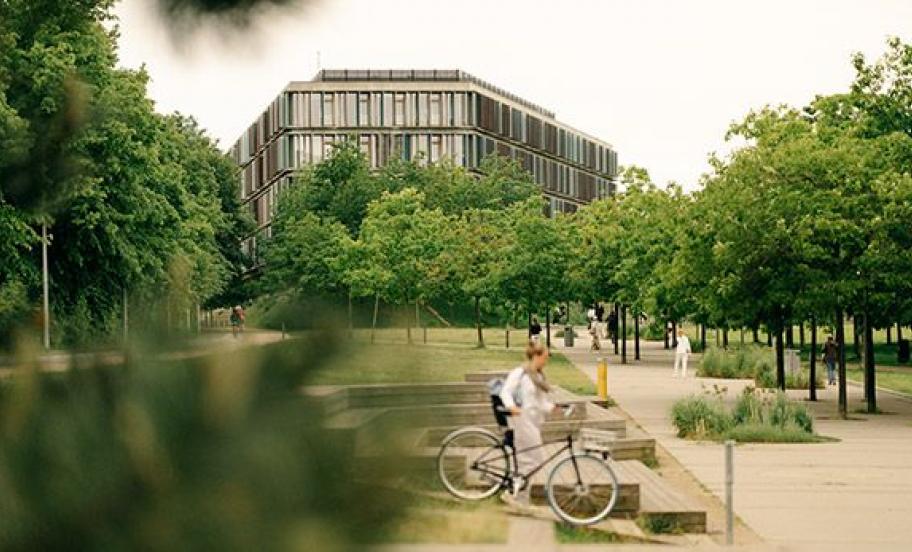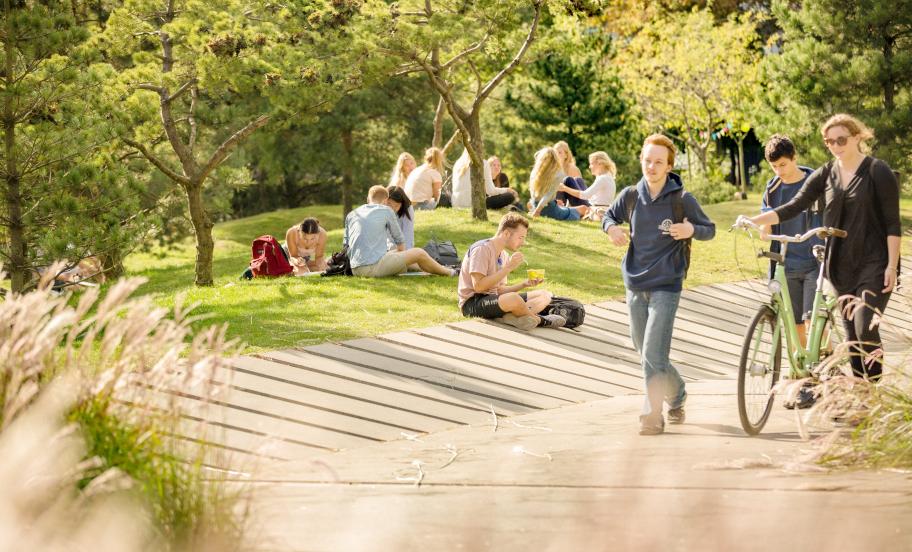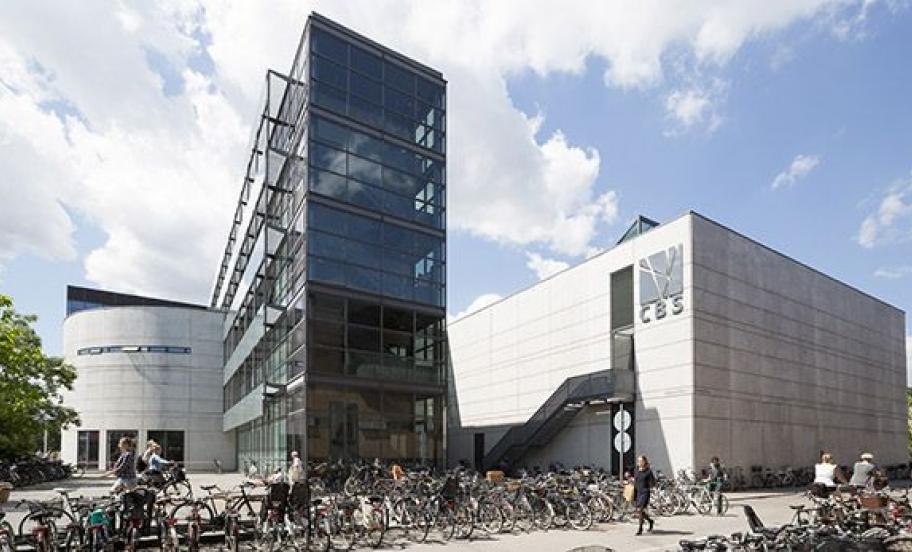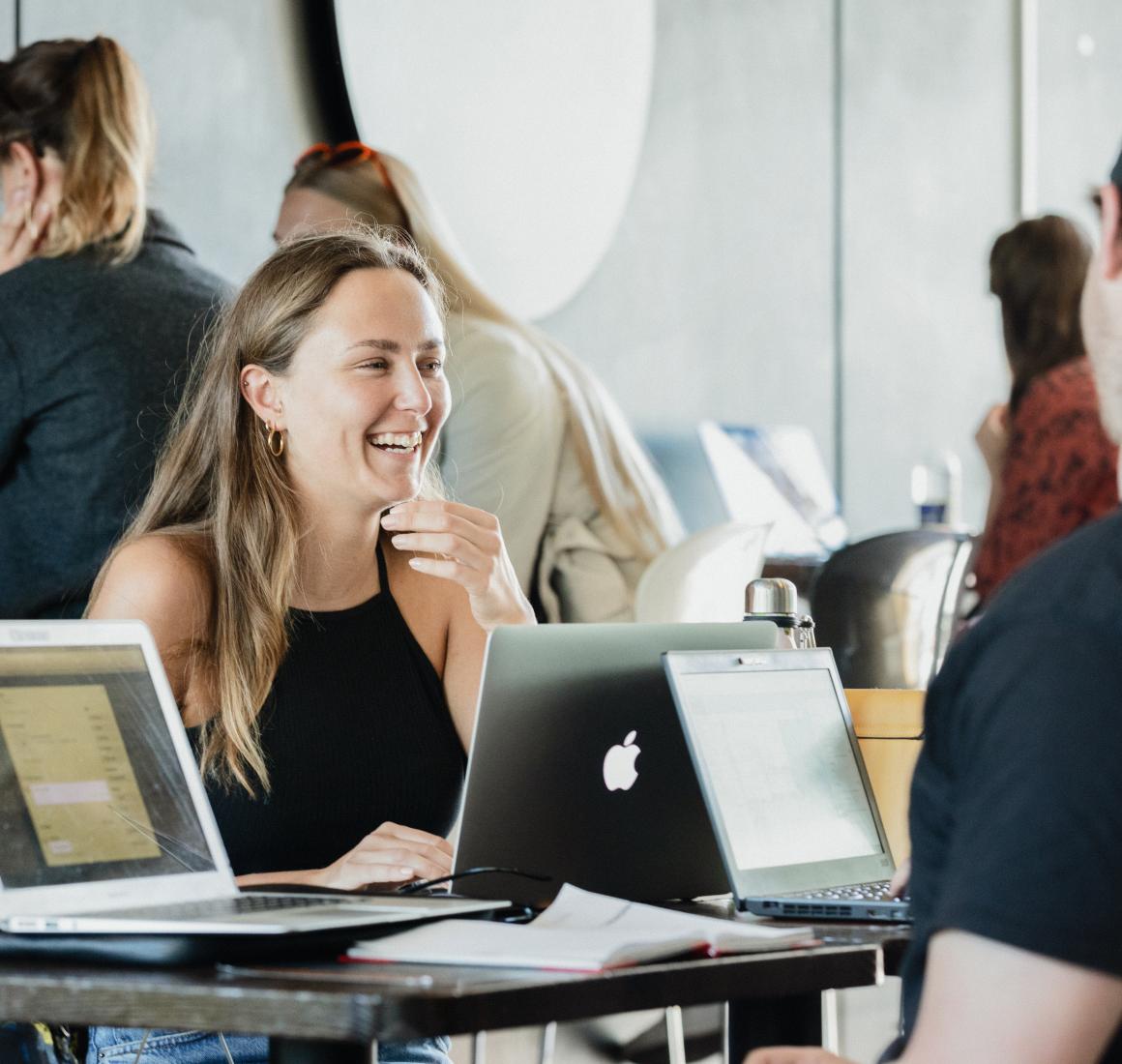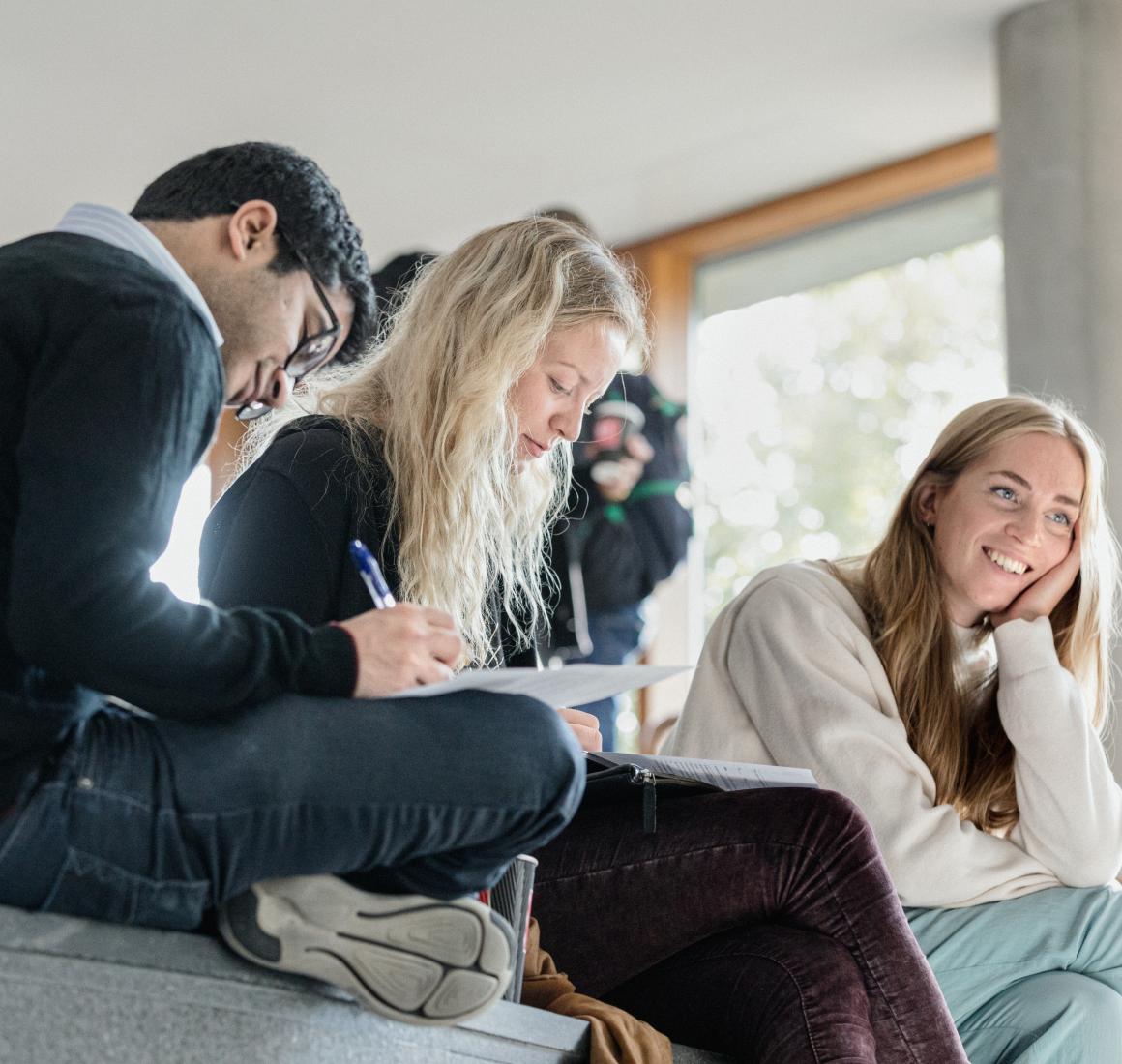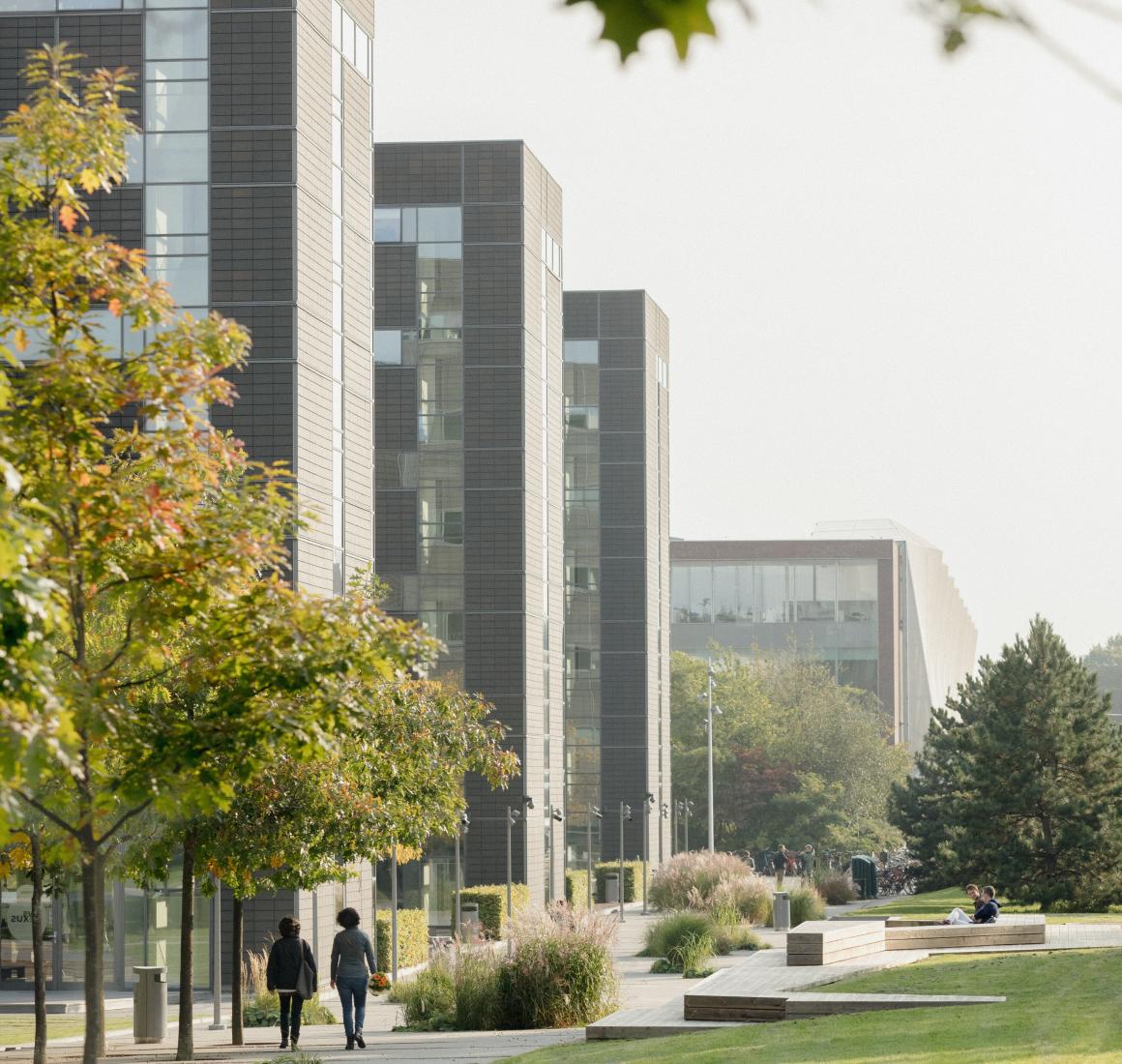MSc in Business, Language and Culture - Business and the Global South (Business and Development Studies)
MSc BGS equips you to navigate the challenges and opportunities of emerging markets and developing economies. You will gain the analytical and cultural skills to work with companies, organisations, and institutions driving sustainable development worldwide.

About MSc in Business, Language and Culture - Business and the Global South (Business and Development Studies)
New name in 2026
From 2026, the name will change from MSc in Business, Language and Culture – Business and Development Studies (MSc BADS) to MSc in Business, Language and Culture – Business and the Global South (MSc BGS).
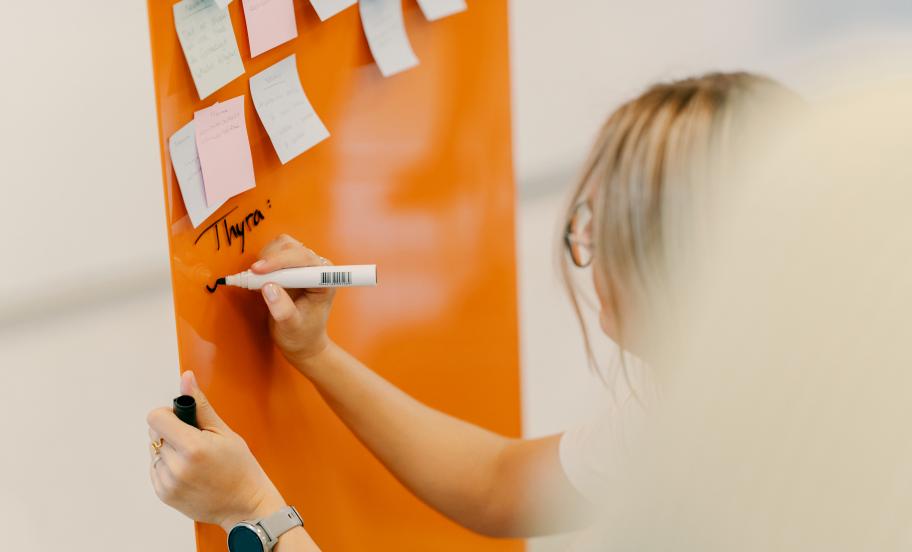
Why study MSc BGS?
3 good reasons to choose MSc BGS
Curious about global development
Into culture and languages
Like solving complex problems
“I like the teaching culture in Denmark. You talk to professors on a first-name basis, and they are very nice and approachable. Coming from Germany, that is still something I'm getting used to.” Andre
Student, MSc BADS

MSc in Business, Language and Culture - Business and the Global South gives you a scientifically based set of interdisciplinary, analytical, and communicative skills and qualify you for a career in globally oriented companies, institutions and organisations, private and public.
Interdisciplinary approach
The MSc BGS combines business, social sciences, and language studies to explore how organisations operate across cultures. This perspective helps you understand how regional values and practices shape global business and how differences can become strengths.
Business meets global development
In MSc BGS, you study international business through the lens of development. You learn how global value chains, foreign investment, and corporate strategies affect growth, sustainability, and inequality in developing countries, and how businesses adapt to challenges in these complex environments.
“A master’s programme has a tendency to be much more career oriented, which is only natural as you narrow down the field you specialise in.” Nicklas
Student, Msc BADS

Spotlight on emerging markets
From Africa and Asia to Latin America, you’ll focus on regions where development and business opportunities are rapidly evolving. You dig into real-world cases that show how culture, institutions, and politics influence business practices, and why emerging markets matter for global growth.
Regional and language competence
A part of the programme is the language component. Alongside English, you choose a reginonal track in either French, German, Spanish, Chinese, English or Japanese, and connect it to your regional studies. This gives you cultural awareness and communication skills that are highly valued in international careers.
Master events
See upcoming events that can help you with your study choice and admission.
Structure
Innovation and entrepreneurship
You learn how innovation and entrepreneurship can drive sustainable growth and development. The focus is on how new business models and creative solutions can address social and economic challenges in emerging economies.
Culture and society
You learn how culture, institutions, and social dynamics influence business and development in global markets. The focus is on understanding the contexts in which organisations operate and how these shape strategies, partnerships, and sustainable outcomes.
3 things to consider
You care about both business and development?
Are you ready for a second language perspective?
Do you enjoy solving complex problems?
Track courses
Regional track courses
You must choose one of the following courses:
Regional track courses with language
The courses are taught in French, Spanish, German for students studying these languages, and in English for students with Chinese and Japanese.
Depending on your choice of language, you will study one of the following courses:
French: Business and Social Responsibility in Francophone Countries
Spanish: Business Strategies in Latin America and the Caribbean
German: Business in a Changing World: German Perspectives
Chinese and Japanese: Institutions and Business Strategy in the Chinese Context
English in the Global South: course description will follow
Programme overview
1st semester
2nd semester
3rd semester
4th semester
More about the programme
Large curriculum
The courses involve significant readings in general approximately 800-1200 pages of course curricula per course. This is a challenge to some students but can be overcome if you plan your studies carefully.
2nd foreign language
For some students the 2nd foreign language is a challenge. You will have courses in area studies taught in your 2nd foreign language. These courses deal with business, cultures and societies in regions in which the language is spoken. This means that you will read and discuss fairly complex academic texts in your 2nd foreign language.
Options during the programme
Electives
On the 3rd semester, you can choose to study courses of your specific interest. CBS offers a large number of electives within a wide range of topics. You can also choose to take electives at other Danish universities. The electives you choose have to be relevant for your programme.
A number of electives are specifically designed to complement the core courses of BADS. Among those are: Poverty, Sustainability and the Private Sector (CCBLV1601U) (autumn), Marketing in Emerging Markets: Seizing the market opportunities in the world’s main growth economies (CCBLV1703U) (autumn), Field study: Entrepreneurship and Private Sector Development in Uganda (CCDEV1135U) (spring)
See the current selection of CBS electives on Courses at master level.
Minor
On the 3rd semester, you can also choose to study a so-called minor. A minor is a package of electives within a specific academic area. Typically, it consists of 3 courses. By taking a minor, you strengthen your competences within a specific area of interest, and you can use it to qualify for specific jobs or industries.
See the current selectives of CBS minors on Minors.
Exchange
Many students choose to go on exchange on their 3rd semester; usually at one of CBS’ more than 300 partner universities. When you go on exchange through CBS, you do not have to pay for the teaching at the foreign university (with a few exceptions), and you can bring your SU (student grant).
Find a list of all CBS partner universities here.
Internship
On BADS, you can choose to replace some or all of your electives with a so-called academic internship. The academic internship consists of an internship period at a company, which is then completed with a project report. You can do the internship at a company in Denmark or abroad. The internship must have an international or intercultural scope, and the project report and work assignments have to be relevant to your study programme.
When doing an internship you get the opportunity to relate theory to practice and reflect on the academic training you receive at CBS in a practical setting.
CEMS
On BADS, you can apply for the CEMS - Master in International Management programme. CEMS MIM is a double degree programme, which gives you the opportunity to add a second degree in international management to you CBS degree. This means that you will get both the MSc degree and the CEMS in International Management degree.
CEMS is a 1-year programme, which you study in combination with your CBS degree in your 3rd and 4th semester. Part of it takes place at one of the other CEMS universities abroad.
Learn more about CEMS / Master in International Management.
Master's thesis
Your 2nd year is completed with a master's thesis. You choose the topic you want to write about which allows you to focus on a specific topic of your interest. Typically, you write your master's thesis with a fellow student.
“I didn't have to do any oral exams in my bachelor’s, so I was a little unfamiliar with what they were going to be like. The teachers are super nice though, the atmosphere is cozy, and it is definitely possible to get good grades.” Andre
Student, MSc BADS

Study environment
A multicultural and supportive environment
You’ll study alongside open-minded and curious classmates who are eager to learn from each other. The atmosphere is both social and academic. Students from the MSc BGS often connect, and group work becomes a chance to explore different perspectives. With so many nationalities represented, you’ll experience a truly global classroom where collaboration and support are at the heart of student life.
Student life at CBS
Studying at CBS is much more than just preparing for and going to classes.
At CBS, there are more than 20,000 students with different backgrounds and nationalities. Teamwork is an essential part of studying at CBS both in classes and in extracurricular activities.
With more than 100 student organisations, you also have plenty of opportunities to engage and connect with students across programmes and classes.
Learn more about the vibrant student life at CBS, the student organisations, and the international environment on Student life.
Read more about Student life on CBS.
For internationals
If you are an international student, we have gathered a lot of information about what it is like to be an international student at CBS and how you can prepare for life in Denmark.
Studying at CBS is more than just preparing for classes. Learn about the student life at CBS, the countless student organisations you can join, and the international environment.
Read more on International students.
Meet the students
For internationals
Are you interested in studying at CBS as a full degree or exchange student? Or participating in CBS Summer University? Are you a freemover or do you want to study a single course? Here you can find information regarding how to apply, how to prepare for life in Denmark and what studying at CBS is like. Welcome!

Teaching and exams
Teaching
The teaching in MSc BGS has a strong focus on mixing theoretical learning and practice. On the 1st semester you are introduced to mainly theoretical material, while on the 2nd semester you’ll learn how to put theory into practice. You do this by writing business projects and cases, presenting different cases in class and having representatives from multinational companies to act as guest lecturers.
Read more about Teaching and working methods.
Exams
Each course is concluded with an exam. This means that you will have exams after each quarter and semester. The exam types in MSc BGS are a mix of the exam types offered at CBS in general. This includes everything from written to oral exams.
Read more about Exams.
Student life at CBS
Being a CBS student is about more than going to lectures and doing exams.
Get a glimpse of student life at CBS. Here, you can explore what a typical day of teaching and exams looks like.
Also, you can learn how our programmes are structured and read about social life on campus, including the many ways to connect with fellow students.
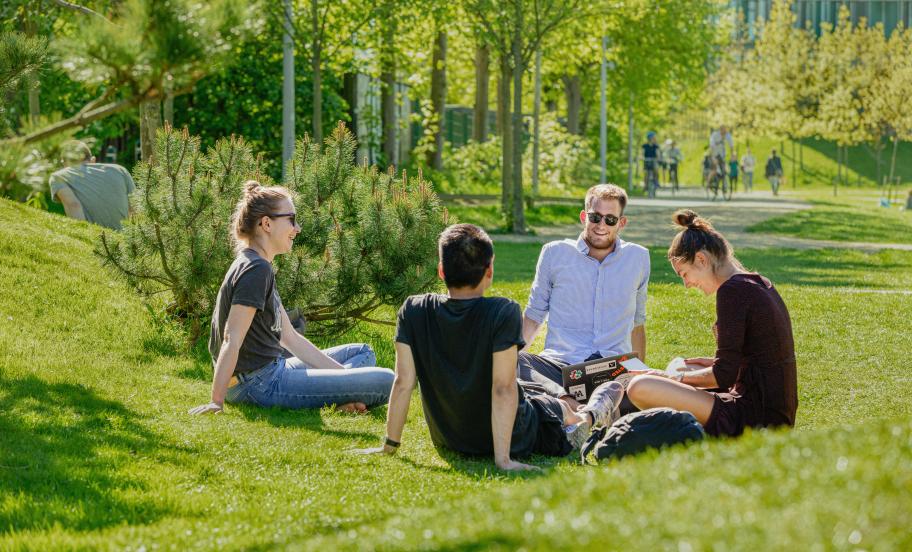
Time consumption
Workload
You should know that it is demanding to study in a graduate programme, and both the curriculum and workload is significantly higher than at bachelor level.
If you are studying on a full-time graduate programme, you should expect spending approximately 37 hours on average on your studies each week. The workload will vary during the year.
Hectic around exams
The time leading up to assignment submissions and exams can be hectic, and you can easily work more than 40 hours a week in this period. Preparing for oral exams can be especially time consuming, because you have to be able to explain and discuss the covered concepts and theories and learn things by heart.
Read more on Teaching and working methods
Student job
Most programmes are quite flexible in terms of combining studies with a student job. Most students work a maximum of 15 hours a week in order to have sufficient time for their studies.
Studying in Denmark - for internationals
If this is your first time studying in Denmark, you may find teaching and exam formats, the grading scale and the academic calendar very different from what you are used to.
Read about everything you need to know as an international student studying at CBS on International students
In need of special support?
Do you have a disability such as dyslexia, anxiety, autism, ADHD, long-term effects of concussion or another physical, psychological or neurological disability?
Then you have the opportunity to apply for Special Educational Support (SPS) and special conditions while studying.
This ensures you can study on equal terms with your fellow students.
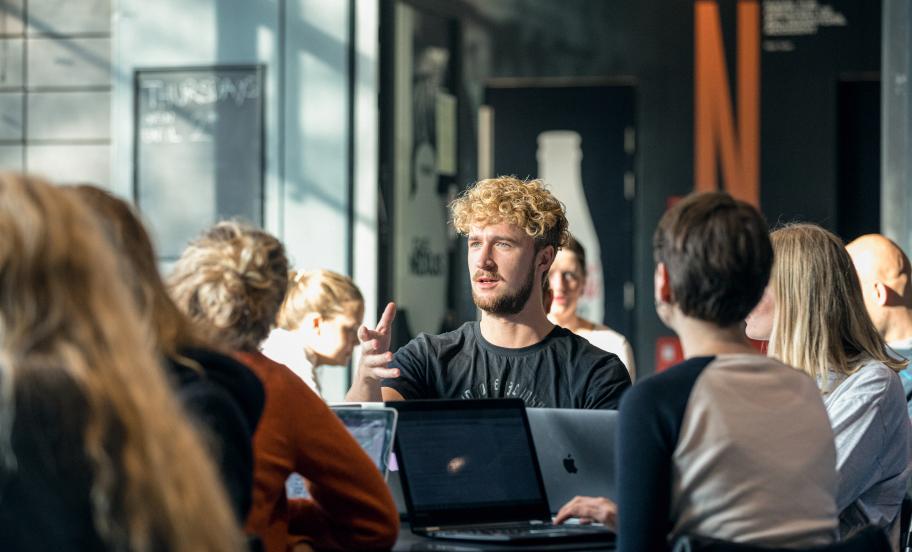
Entry requirements
Entry requirements
You are qualified for admission to the study programme if you fulfil the following requirements.
Please note that fulfilling the requirements does not guarantee you a study place.
1. Bachelor degree
2. Language requirement
3. Academic requirements
1. Bachelor degree
Bachelor degree
You must hold a bachelor degree to fulfil the general requirement for admission to CBS’ master programmes. You must have completed your bachelor degree before study start.
Legal claim
MSc in Business, Language and Culture is the natural progression for
- BSc in Business, Language and Culture from CBS
- BSc in International Business in Asia from CBS
If you hold one of the above-mentioned bachelor degrees, you automatically fulfil all the entry requirements and you may also have legal claim guaranteeing admission. Read more about legal claim.
If you do not have one of the above-mentioned bachelor degrees, you can still be qualified for the programme, if you have an equivalent academic background and if you fulfil the entry requirements.
Have you not yet completed your bachelor degree?
You can apply for admission even if you have not yet completed your bachelor’s degree. However, you must finish it before study start. If you are offered a place, you will be conditionally admitted, which means:
- You must complete your bachelor’s degree before you can begin your studies at CBS.
- You must upload your bachelor diploma and transcript no later than 31 August.
2. Language requirement
English level A (Panel content)
The language requirement
The language requirement is English at Danish level A.
Documentation deadline
You must fulfil and document the language requirement before the application deadline.
Check if you fulfil the language requirement
Use the tabs above to find out how you can document English level A. Each tab shows an approved way to fulfil the requirement, depending on your background.
We do not accept any documents other than those listed in the tabs.
The following cannot be used as alternatives:
- a letter from your university
- a letter from a professor
- a combination of several incomplete qualifications from the lists above
- Bachelor degrees or courses regardless of origin and level
Danish upper secondary exam (Panel content)
Required courses and levels
Danish upper secondary exam
If you have passed English level A from an upper secondary school in Denmark (ie. stx, hhx, htx, hf) you fulfil this requirement.
English level A must be passed with a minimum grade point average of 2.0.
Supplementary upper secondary courses
English A as a single subject via secondary school supplementation (Gymnasialt suppleringskursus (GSK)) or as a Higher Preparation Examination single subject (HF-enkeltfag).
English level A must be passed with a minimum grade point average of 2.0.
Individual competency assessment (IKV)
If you think you have language competences corresponding to an English level A, you have the possibility to request an assessment - Individuel Kompetencevurdering (IKV) from a Danish VUC (adult education centre).
Required documentation
Upper secondary (ie. stx, hhx, htx, hf) certificate:
- a scan/photo of the original, stamped and signed hard copy or
- a digitally signed certificate downloaded from Min Kompetencemappe
Individual competency assessment (IKV):
- Official IKV assessment
Other upper secondary exams (Panel content)
Find your country
Austria
Required courses and levels
Minimum total sum of 11 weekly lessons over years 10, 11 and 12 and Erste lebende Fremdsprache and Wahlpflichtgegenstände in English language. Subjects that are taught in English even as Wahlpflichtgegenstände do not count.
Required documentation
Reifeprüfung diploma certificate including Stundentafel covering (min.) 4 years of the Oberstufe OR
Reife- und Diplomprüfung diploma certificate including Stundentafel covering (min.) 5 years of the Oberstufe.
International Baccalaureate (IB)
Required courses and levels
- English A1, higher level
- English A2, higher level
- English B, higher level
- English A1, standard level
- English A2, standard level
- English A Language and Literature, higher level
- English A Language and Literature, standard level
- English A Literature, higher level
- English A Literature, standard level
Required documentation
Official IB diploma and/or transcript. Alternatively, you can give CBS access to your results via IBO.org.
European Baccalaureate (EB)
Required courses and levels
• L I
• L II
• L III – 6 years (documentation for 6 years must be included)
Required documentation
Official EB diploma and/or transcript
Australia
Required courses and levels
A complete upper secondary education from Australia, where the majority of the education has been taught in English, fulfils the English A language requirement.
Required documentation
Senior Secondary Certificate of Education (SSCE) as well as Statement of Result or Record of Achievement or Qualifications Certificate, covering subjects and grades during the last two years of the secondary education.
Bulgaria
Required courses and levels
English as first foreign language (556 number of classes) AND English Intense Study (648 number of classes)
Required documentation
- Diploma za (Zavarsheno) Sredno Obrazovanie / za Sredno Obrazovanie and
- Grade transcript for Years 10, 11 and 12
Canada
Required courses and levels
A complete upper secondary education from Canada, where the majority of the education has been taught in English, fulfils the English A language requirement.
Required documentation
High School Diploma / Graduation Diploma (or equivalent for your province) as well as Transcript of grades / High School Results (or equivalent for your province)
England, Wales, Northern Ireland
Required courses and levels
- A complete upper secondary education taught in England, Wales or Northern Ireland or
- A level English Language or
- A level English Literature
Required documentation
- GCSE certificate(s) (with a min. of 6 subjects) as well as A-level (Advanced level) certificate(s) (with a min. of 3 subjects) both taken in the UK or
- Official A level certificate for either English Language or English Literature
Germany
Required qualifications
English passed (5 points or higher) as a higher level course (either erhöhtes Anforderungsniveau or Leistungskurs) in both the Qualifikationsphase (half-year results) and the Abiturprüfung (Prüfungsfach) as part of the Abitur.
Courses marked erhöhtes Anforderungsniveau or Leistungskurs may be designated in a number of different ways such as:
- L or LK or Leistungskurs
- P or Profilfach
- K or Kernfach*
- eA or erhöhtes Anforderungsniveau
- E and designated as erhöhtes Anforderungsniveau in the certificate legend
- HF or Hauptfach
- PF or Profilfach
- Highlighted in grey and and designated as Leistungsfächer in the certificate legend
*If you have had English as a Kernfach your Abiturzeugnis needs to state that this means you have had English at either erhöhtes Anforderungsniveau or as Leistungskurs.
For applicants with a Waldorfschule/Rudolf Steiner Schule Abitur or Deutsche Internationale Abitur/prüfung (DIA/DIAP) please contact graduateadmission@cbs.dk for more information.
Required documentation
All pages of your Zeugnis der Allgemeinen Hochschulreife (Abiturzeugnis): cover, diploma and report card for all 4 half-years showing the Qualifikationsphase as well as the Abiturprüfung
Iceland
Required qualifications
For upper secondary studies completed according to the 2008 reform:
Minimum 25 Fein (new credits) obtained in English; of these, minimum 15 Fein must be at Þrep (qualification level) 3 or higher
For upper secondary studies completed according to the 1999 reform:
- Minimum 18 einingar (old credits) obtained in English; minimum one English subject must be at level 6 or higher (e.g. ENS 603)
Required documentation
Official transcript (in Icelandic) for Stúdentspróf
NB: Letters issued by the institution that do not list the names, module codes, grades and codes/points for all the passed courses are not accepted.
Ireland
Required qualifications
A complete upper secondary education from Ireland, where the majority of the education has been taught in English, fulfils the English A language requirement.
Required documentation
The Established Leaving Certificate Examination (Leaving Cert) with a min. of 6 subjects total
Malta
Required qualifications
A level
Required documentation
Matriculation Certificate and Advanced Level Certificate og Intermediate Level Certificate
New Zealand
Required qualifications
A complete upper secondary education from New Zealand, where the majority of the education has been taught in English, fulfils the English A language requirement.
Required documentation
National Certificate of Education Achievement (NCEA) levels 1 and 2 and 3
Norway
Required qualifications
The following combinations from the Norwegian upper secondary education courses must be passed:
VG3 SPR3010 & SPR3011
or
VG3 SPR3012 & SPR3013
or
VG SPR3031 & SPR3032
Required documentation
Official transcript for the Vitnemål for videregående opplæring
Scotland
Required qualifications
A complete upper secondary education from Scotland, where the majority of the education has been taught in English, fulfils the English A language requirement.
Required documentation
Scottish Qualification Certificate as well as Summary of Attainment, Detail Record of Attainment and Profiles
Singapore
Required qualifications
A complete upper secondary education from Singapore, where the majority of the education has been taught in English, fulfils the English A language requirement.
Required documentation
Singapore-Cambridge GCE A-level exam certificate with a min. of 4 (H1, H2 and H3) exams total, as well as General Paper and Project Work
South Africa
Required qualifications
A complete upper secondary education from South Africa, where the majority of the education has been taught in English, fulfils the English A language requirement.
Required documentation
National Senior Certificate (Matric/Matriculation Certificate) as well as grade transcript covering subjects and grades during all three years of studies
United States
Required qualifications
A complete upper secondary education from the United States, where the majority of the education has been taught in English, fulfils the English A language requirement.
Required documentation
High School Diploma as well as High School Grade transcript (covering all four years’ worth of subjects and grades) taken in the US.
The following upper secondary qualifications do not fulfil English level A
The highest upper secondary level of English from the following countries does not fulfil English level A. If your upper secondary education is from one of the countries listed below, you will need to take a language test:
- Belgium
- Croatia
- Cyprus
- Czechia
- Estonia
- Finland
- France
- Greece
- Hungary
- Italy
- Latvia
- Liechtenstein
- Lithuania
- Luxembourg
- The Netherlands
- Poland
- Portugal
- Romania
- Slovakia
- Slovenia
- Spain
- Sweden
- Switzerland
- All non-EU countries other than Australia, Canada, New Zealand, UK, Singapore, South Africa and the US
Language tests (Panel content)
Language tests
TOEFL
TOEFL iBT/iBT Home Edition
The TOEFL iBT/ iBT Home Edition taken on or after 21 January 2026 must be passed with both
- a minimum overall score of at least 5 and
- a minimum score of 4,5 in each of the four different sections
Exceptionally, we accept an overall score of 94 (old scale) and 4,5 (new scale) in 2026. Both of these results must be present on the certificate. The subscores must still be a minimum of 4,5 in each of the four sections.
The TOEFL iBT/ iBT Home Edition taken before 21 January 2026 must be passed with both
- a minimum overall score of at least 94 and
- a minimum score of 20 in each of the four different sections
MyBest scores are not accepted.
Read more about the TOEFL and how to register on ETS.org
Documentation
Your TOEFL scores will be verified in the TOEFL database. You must list Copenhagen Business School as one of your score recipients when you sign up for the TOEFL test, or order a score sheet for Copenhagen Business School if you have already taken the test.
The TOEFL institution code for CBS is 7035.
You must upload either your digital copy, or a scan of your hard copy, TOEFL score sheet to the Application Portal.
Have you already passed a test?
Remember to check that your test date is no older than two years by the application deadline.
Be aware that it is your test date and not the date your test results were issued. If your test date is more than two years old by the application deadline, your test will not be accepted.
IELTS
IELTS Academic test
An IELTS academic test result of at least 7.0 with minimum 6.0 in each discipline is required.
IELTS tests that are more than two years old by the application deadline are not accepted
IELTS Online is accepted.
IELTS One Skill Retake scores are not accepted.
Read more about IELTS and how to register
Required documentation
Your IELTS results will be verified in the IELTS database. Please instruct your test centre to make your results available to Copenhagen Business School, either when you book your IELTS test or after the test date.
You must also upload a scan of your IELTS test report form to the Application Portal. If you have not received the physical test report form, you can upload a document with the "Test Report Form Number" (TRF Number) so we can verify your scores.
Have you already passed a test?
Remember to check that your test date is no older than two years by the application deadline.
Be aware that it is your test date and not the date your test results were issued. If your test date is more than two years old by the application deadline, your test will not be accepted.
Cambridge
The following Cambridge exams/certificates fulfil the English A language requirement.
- Cambridge C2 Proficiency (Certificate of Proficiency in English) passed with minimum C and an overall score of minimum 200.
Read more about the CPE and how to register.
- Cambridge C1 Advanced (Certificate of Advanced English) passed with minimum C and an overall score of minimum 185.
Read more about the CAE and how to register.
Documentation
In order for us to verify your results, you need to do the following:
- Sign up and share your results with Copenhagen Business School via the Candidate Results Website. Your Cambridge results are only valid if we can check them on their website.
- Upload your Cambridge C2 Proficiency (CPE) or Cambridge C1 Advanced (CAE) Statement of Results and/or Certificate in the application portal
The Certificate of Proficiency in English and Certificate of Advanced English have no expiration date and are valid for life.
CBS bachelor degree (Panel content)
English-taught bachelor degree from CBS
Applicants with an English-taught bachelor degree from CBS who continue their studies in English at master level have already had their qualifications checked and do not need to upload additional documents.
Danish-taught bachelor degree from CBS
If you have a Danish-taught bachelor degree from CBS, you must document that you fulfil English A. We did not check your English A qualifications when you applied for your bachelor degree, as it was not a requirement for a Danish-taught programme.
3. Academic requirements
Academic requirements
You must fulfil the academic requirements before study start.
The academic requirements are as follows:
- 25 ECTS-points in Business Administration / Economics
- 5 ECTS-points in Micro / Macroeconomics
- Language and Culture*
* How this requirement is fulfilled depends upon the regional track chosen. Please check your chosen regional track for further details - French, German, Spanish, Chinese, Japanese or English in the Global South.
Examples of Business Administration include Marketing, Strategy, Organisation, Management, Accounting, Finance and Innovation/Entrepreneurship
Examples of Economics include Microeconomics, Managerial Economics, Industrial Economics, Macroeconomics, International Trade and Monetary Economics
Language and culture requirement
Regional Track - French
To fulfil the ‘Language and Culture’ requirement for the French regional track, you must document one of the following:
- DALF C2
- DALF C1
- DELF tout public B2
- 60 ECTS-points passed at bachelor level focusing on French (language courses and cultural area studies courses only. Other courses, for example Economics, taught in French do not fulfil this requirement)
- Upper secondary education fully taught in French AND 15 ECTS-points in language*/cultural/political/society studies
- Bachelor degree fully taught in French AND 15 ECTS-points in language*/cultural/political/society studies
Regional Track - German
To fulfil the ‘Language and Culture’ requirement for the German regional track, you must document one of the following:
- Goethe-Zertifikat C2
- Goethe-Zertifikat C1
- Goethe-Zertifikat B2
- Deutsche Sprachdiplom der Kulturministerkonferenz - zweite Stufe (DSD II)
- 60 ECTS-points passed at bachelor level focusing on German (language courses and cultural area studies courses only. Other courses, for example Economics, taught in German do not fulfil this requirement)
- Upper secondary education fully taught in German AND 15 ECTS-points in language*/cultural/political/society studies
- Bachelor degree fully taught in German AND 15 ECTS-points in language*/cultural/political/society studies
Regional Track - Spanish
To fulfil the ‘Language and Culture’ requirement for the Spanish regional track, you must document one of the following:
- DELE nivel C2
- DELE nivel C1
- DELE nivel B2
- SIELE GLOBAL with a min. level of B2 in all four disciplines
- 60 ECTS-points passed at bachelor level focusing on Spanish (language courses and cultural area studies courses only. Other courses, for example Economics, taught in Spanish do not fulfil this requirement)
- Upper secondary education fully taught in Spanish AND 15 ECTS-points in language*/cultural/political/society studies
- Bachelor degree fully taught in Spanish AND 15 ECTS-points in language*/cultural/political/society studies
Regional Track - Chinese
To fulfil the ‘Language and Culture’ requirement for the Chinese regional track, you must document one of the following:
- HSK Level 6
- HSK Level 5
- HSK - Level 4 AND Speaking Test Intermediate Level
- 60 ECTS-points passed at bachelor level focusing on Chinese (language courses and cultural area studies courses only. Other courses, for example Economics, taught in Chinese do not fulfil this requirement)
- Upper secondary education fully taught in Chinese AND 15 ECTS-points in language*/cultural/political/society studies
- Bachelor degree fully taught in Chinese AND 15 ECTS-points in language*/cultural/political/society studies
Regional Track - Japanese
To fulfil the ‘Language and Culture’ requirement for the Japanese regional track, you must document one of the following:
- JLPT level N1
- JLPT level N2
- 60 ECTS-points passed at bachelor level focusing on Japanese (language courses and cultural area studies courses only. Other courses, for example Economics, taught in Japanese do not fulfil this requirement)
- Upper secondary education fully taught in Japanese AND 15 ECTS-points in language*/cultural/political/society studies
- Bachelor degree fully taught in Japanese AND 15 ECTS-points in language*/cultural/political/society studies
Regional Track - English in the Global South
To fulfil the ‘Language and Culture’ requirement for the English in the Global South regional track, applicants must document the following:
- Non-English language subject passed in an exam as part of a formal school education from a Global South country with English as an official language* AND 15 ECTS-points at bachelor level in Politics / Culture / Society Studies
*A Global South country as defined by the UN (only countries with English as the, or one of the, official languages are included).
Check if you fulfil academic requirements
Advance assessment (Panel content)
Check the advance assessments
CBS Admissions cannot make a pre-assessment of your individual qualifications before you apply for admission.
Find your bachelor programme
Instead, we have assessed a number of bachelor programmes. In these so-called advance assessments, you can see whether your bachelor degree fulfils the academic entry requirements.
An advance assessment shows whether the obligatory courses in your bachelor programme fulfil the academic requirements for a master programme at CBS. We typically prepare an advance assessment when many applicants from the same bachelor programme apply for the same master programme.
You can find them by clicking on the tabs above.
Missing courses?
If you are missing courses, you may be able to fulfil the requirements through relevant elective courses or supplementary courses.
See what to do if you are missing courses to fulfil the academic requirements.
No advance assessment?
If your bachelor programme is not listed under the tabs above, you can make your own assessment of to what extent you meet the entry requirements through the courses you have taken in your bachelor programme and any supplementary courses.
Use the form below.
CBS (Panel content)
Potentially qualifying bachelor degrees
Check to see which academic areas you are missing in order to fulfil the academic requirements in 2026:
HA(psyk.)
Enrolled all years
- You must fulfil one of the bullet points listed for the regional track applied for
BSc in International Business and Politics
Enrolled all years
- You must fulfil one of the bullet points listed for the regional track applied for
BSc in Business Administration and Sociology
Enrolled all years
- You must fulfil one of the bullet points listed for the regional track applied for
BSc in International Business
Enrolled all years
- You must fulfil one of the bullet points listed for the regional track applied for
HA i Europæisk Business
Enrolled all years
- You must fulfil one of the bullet points listed for the regional track applied for
Denmark (Panel content)
Potentially qualifying bachelor degrees
Check to see which academic areas you are missing in order to fulfil the academic requirements in 2026:
KU - Bachelor i asienstudier (Japanstudier or Kinastudier)
Enrolled all years is missing:
5 ECTS-points Micro/Macroeconomics
25 ECTS-points Business Administration
Language & Culture (French, German, Spanish, Chinese, Japanese):
Japanstudier: Language and Culture fulfilled for the Japanese regional track only
Kinastudier: Language and Culture fulfilled for the Chinese regional track only
All other regional tracks:
You must fulfil one of the bullet points listed for the regional track applied for
SDU - BA negot.
Enrolled all years
- Language & Culture (French, German, Spanish, Chinese, Japanese):
BA negot Tysk: Language and Culture fulfilled for the German regional track only
All other regional tracks:
You must fulfil one of the bullet points listed for the regional track applied for
Make a self-assessment
What is a self-assessment?
If there is no advance assessment available for your bachelor’s degree, you can make a so-called self-assessment of your educational background.
If there is an advance assessment of your bachelor degree showing that you are missing certain academic areas to fulfil the academic requirements, you can also use the self-assessment to show how you fulfil the missing academic areas.
Your self-assessment is not binding for us, but it can help you prepare your application and give us a better overview of your educational background.
How to make a self-assessment
Start by listing all the undergraduate courses you have taken, or are going to take, as part of your bachelor's degree or in addition to it, and compare them to the programme's academic requirements.
Read your course titles and descriptions carefully. Try to categorise the courses according to the master programme’s academic requirements.
To get an idea of how we assess each course category, you can use the course catalogue to see how we have categorised different CBS elective courses or CBS Summer University courses within each category.
Use the self-assessment form
We have created a form you can use for your self-assessment. The form is a tool to help you match your courses with the academic entry requirements for the programme and see to what extent you fulfil them.
Remember to include
- Courses you have already passed
- Courses you are currently taking
- Courses you expect to pass (e.g. supplementary courses at summer university)
Chance of admission
More applicants than places
This programme has a limited number of study places.
If there are more qualified applicants than available places, we will select the best qualified applicants. The selection is based on an overall assessment of the applicants’ educational background at bachelor’s level or equivalent.
Selection criteria
In the selection of qualified applicants, we look at
- Analytical skills and experience with social science methodology
- Grades and relevance of educational background at undergraduate level, with a focus within any of the following academic areas: finance, economics, strategy, management, politics, sociology and cultural understanding
- Personal statement*
*If you have a legal claim to MSc in Business, Language and Culture - Business and the Global South (Business and Development Studies), you do not have to write a personal statement, but just upload a blank word document.
Personal statement
The personal statement is your opportunity to describe yourself in relation to the master programme you are applying for.
You can, for example, describe:
- Your experience from work, studies, leisure activities or similar
- How your experience relates to the programme and the regional track of your choice
- How the programme relates to your future career ambitions
Requirements for the personal statement
- Maximum 2 A4 pages
- Minimum font size 11
- In English
Connection to the Danish Labour Market
Your connection to the Danish labour market will be taken into consideration as part of the selection process. In your application, you will be asked to write a paragraph of no more than 500 characters (including spaces), describing your current circumstances and reflecting on your future career opportunities in Denmark.
Apply for admission
Master events
See upcoming events that can help you with your study choice and admission.
Admission in numbers
Career
Competencies
The international focus of the programme and the mix of theory with real-life cases give you direct exposure to companies and institutions working in development and emerging markets. You also gain hands-on experience working across cultures, which prepares you for international teamwork and global careers.
On top of that, you graduate with the tools and methods needed to work with investments, projects, and interventions in developing countries and fast-growing economies. Together, these skills make you stand out to employers in business, NGOs, government, and international organisations.
Competence profile
In the competence profile you can read more about the purpose of the programme and the competencies you achieve in the programme:
See the competence profile
What do you learn on MSc BGS ?
Global business analysis
Intercultural communication
Sustainability and development insight
Career opportunities
Graduates work in various industries such as:
-
International companies – in roles related to strategy, sustainability, supply chains, or emerging markets.
-
Consulting – advising on global development, responsible business, or market entry strategies.
-
NGOs and civil society organisations – working with projects in sustainability, human rights, and development.
-
International organisations – such as the UN, World Bank, or regional development agencies.
-
Government and public sector – in ministries, embassies, or trade and development agencies.
The typical job tasks for a graduate:
-
Employee at the UN and other international organisations
-
Project manager in developing country subsidiaries of international firms
-
Manager of Corporate Social Responsibility
-
Marketing function related to emerging markets
-
Project manager in NGO working with developing countries
-
Civil servant in foreign affairs ministries
-
Consultant in development oriented consultancies
Life long learning
We want you, as a student, to continue developing both personally and professionally throughout your life. CBS aims to support you in applying your knowledge in your organisation and company. Our goal is for you to keep expanding your knowledge and skills, to engage actively in organisational and societal development, and to contribute to shaping a sustainable and democratic society.

CBS and your career
With a programme from CBS, you are a step closer to pursue the career you aspire to. We work closely with a wide range of companies in Denmark because we continuously develop our programmes to match the needs of society. Read more about your career options here.

More about MSc in Business, Language and Culture - Business and the Global South (Business and Development Studies)
MSc BGS equips you to navigate the challenges and opportunities of emerging markets and developing economies. You will gain the analytical and cultural skills to work with companies, organisations, and institutions driving sustainable development worldwide.
Other master programmes
Curious about similar study programmes? You may find other study programmes that also match your interests and dreams for your career.
